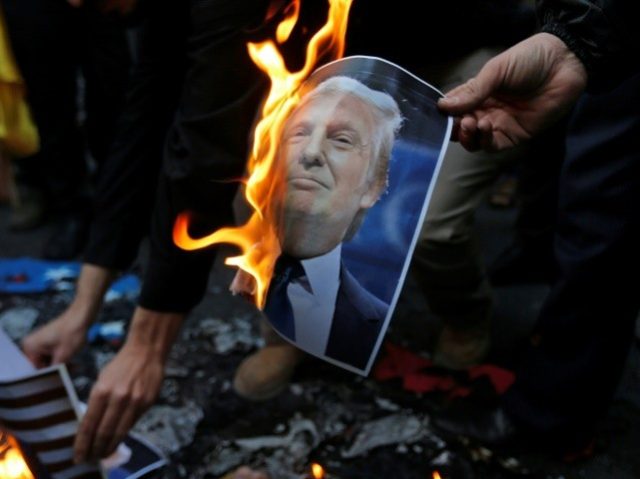China’s state-run Global Times newspaper has weighed in on street protests in Iran, publishing a column Tuesday arguing that the popular rebellion “proves” that “Washington is less authoritative in defining world affairs than in previous years.”
A separate column blames the United States and Saudi Arabia for the protests, while commentary from China’s former ambassador to Iran suggests that the West is “exaggerating” the scope of the protests, a common talking point in Iranian publications allied to the state.
The articles linking unrest in Iran to the United States establish a different tone than the language out of the nation’s foreign ministry. Spokesman Geng Shuang issued a short response Wednesday to the only question presented to him on Iran, saying, “China hopes that Iran will maintain stability and achieve development.”
Iran is a key geostrategic location for China’s “One Belt One Road” plan, which aspires to carve out major trade routes between Beijing and western Europe to be exploited by the Chinese government in its quest for global influence.
The Global Times rejected the possibility that the protests could hinder the development of One Belt One Road in a column published Tuesday. “The mass demonstrations in Iran will not affect the Belt and Road Initiative in the region,” the article states, “but serve as a reminder that robust economic development could prevent ‘overseas hostile forces’ from toppling a sovereign government.”
The Times shies away from identifying the United States as that “overseas hostile force” in this particular article, but saves the anti-American rhetoric for another piece. “The international community should not encourage Washington’s brazen interference with Iran’s domestic affairs,” the publication warns. “The U.S. is instigating protesters to confront the government. If the protests turn into a violent revolution, perhaps Washington will support those demonstrators unconditionally.”
“Teheran can ignore Washington’s stance and make choices that benefit the country and its people most,” the newspaper suggests,” adding, “Anyway Washington is less authoritative in defining world affairs than in previous years, which is proved by the current chaos in Iran.”
Hua Liming, the former Chinese ambassador to Iran, tells the publication that Iran has invested too heavily in “great victories” abroad, triggering the protests. Iran has dedicated significant resources to the terrorist group Hezbollah and to illicit activity by its Islamic Revolutionary Guard Corps (IRGC) in Syria, Iraq, and Yemen. “If a country can satisfy its people by effectively developing the economy and improving people’s livelihood,” Hua adds, “hostile foreign forces won’t have any chance of creating problems to shake its governance.”
In another sign that China is attempting to promote the narrative that the Iran protests somehow signify a failure for the U.S. government, the state-run newspaper China Daily ties Iran’s economic woes, believed to have spawned the protests, to President Donald Trump enacting sanctions against the Islamist regime.
“[A]lthough Iran reached a nuclear deal with world powers in 2015, the United States, instead of lifting its sanctions on Iran, has only slapped fresh sanctions on it, further worsening Iran’s economic outlook,” China Daily laments. “The longtime enmity between Teheran and Washington and the deep running rivalry between Teheran and Riyadh appear to also be factors behind the demonstrations.”
Iran and China are close allies. The militaries of both nations engaged in joint military drills in the Persian Gulf in June, and Iranian President Hassan Rouhani has made visits to Beijing to discuss trade and political cooperation. Beijing has stood adamantly against undoing the Iran nuclear deal conducted under former President Barack Obama, which provided Iran with a multi-billion-dollar windfall.
Protests in Iran began last week following an astronomical increase in the prices of some food goods, including eggs and poultry. While protesters initially demanded economic relief, they rapidly shifted gears to protest Tehran’s interventions in Syria and Iraq, as well as demand that the mullahs running the country turn their attention away from Palestinian resistance and towards the well-being of the Iranian people. Some also chanted “death to Rouhani,” “death to Khamenei,” and “death to Hezbollah.”

COMMENTS
Please let us know if you're having issues with commenting.